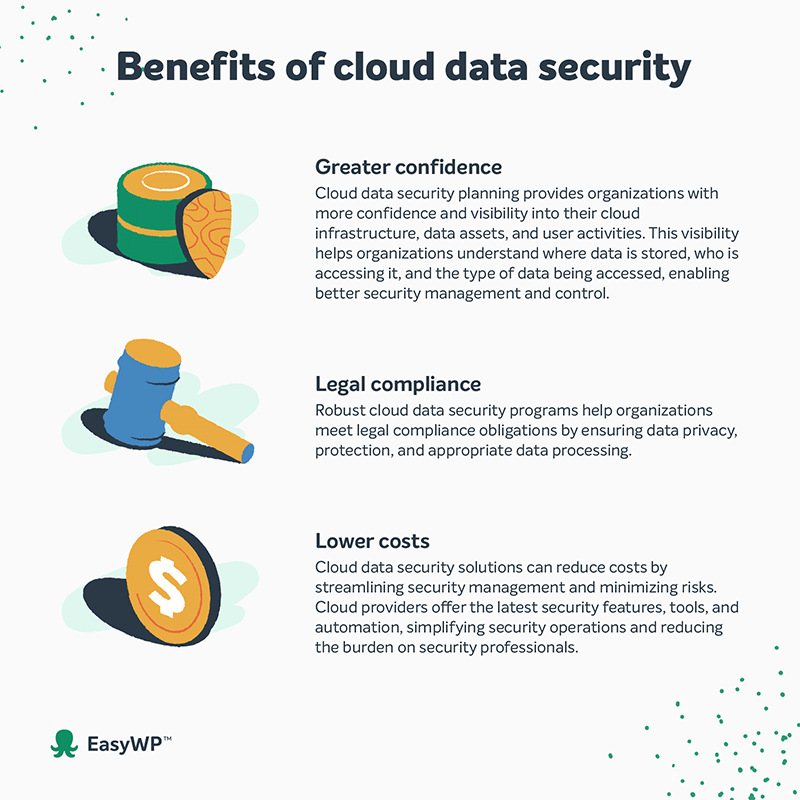Cloud security best practices: a complete guide


Cloud data security has become paramount for website owners of all sizes. With the increasing adoption of cloud computing and the ever-expanding volume of data being generated, it is crucial to ensure that sensitive information remains secure from unauthorized access, data breaches, and system failures.
This comprehensive guide will explore the value of cloud data protection, discuss the challenges site owners face in securing their cloud data, and provide actionable best practices to enhance cloud security for WordPress and beyond.
Understanding cloud data protection
Cloud data protection involves implementing (and sticking to) a set of practices to safeguard data in a cloud environment. As more sensitive information migrates to the cloud, cybersecurity threats also increase. Site owners must prioritize cloud protection practices as a crucial aspect of their overall security strategy.
Cloud data protection plans help people address the following key concerns:
- Potential risks. According to research, approximately 15 million data records were exposed worldwide due to data breaches in 2022. Implementing cloud data protection measures can help mitigate the risk of intellectual property theft and possible compromises of trade secrets.
- Scope of vulnerabilities. Many organizations rely on multiple third-party cloud hosting providers. Each provider can introduce unique challenges in terms of data access and sharing. Implementing proper cloud data protection practices ensures that organizations control where their site media, applications, and data are stored, reducing the risks associated with third-party hosting.
- Shared responsibilities. Cloud providers, site managers, and all users have shared security responsibilities. Site owners must understand their role and responsibilities in securing their cloud data, as well as the responsibilities of their cloud service provider. Misunderstandings or misapplications of shared security responsibilities can lead to security gaps.

Benefits of cloud data security
Developing robust cloud data security resources offers several benefits to site owners:
Greater confidence
Cloud data security planning provides organizations with more confidence and visibility into their cloud infrastructure, data assets, and user activities. This visibility helps organizations understand where data is stored, who is accessing it, and the type of data being accessed, enabling better security management and control.
Legal compliance
Robust cloud data security programs help organizations meet legal compliance obligations by ensuring data privacy, protection, and appropriate data processing.
Lower costs
Cloud data security solutions can reduce costs by streamlining security management and minimizing risks. Cloud providers offer the latest security features, tools, and automation, simplifying security operations and reducing the burden on security professionals.
Cloud data security best practices
To enhance cloud data security, organizations should consider implementing the following best practices:
Implement multi-factor authentication (MFA)
Using a username and password combination is no longer sufficient to protect user accounts from cybercriminals. Implementing multi-factor authentication adds a strong layer of security by requiring users to set up two or more verification factors to access their online accounts. This precaution significantly reduces the risk of successful cyber attacks.
WordPress site owners must prioritize MFA across all facets of their online presence. Protecting your domain and hosting backend is paramount, so EasyWP, powered by Namecheap Cloud, offers MFA protection for your domain, hosting plan, and any other Namecheap services you subscribe to.
Additionally, fortifying your WordPress dashboard with MFA is equally essential. Leading security plugins like Sucuri and Wordfence, provide excellent tools for this purpose. By implementing MFA comprehensively, WordPress site owners can substantially enhance their security posture, ensuring online assets remain well-defended against potential threats.
Enforce cloud backup solutions
While the likelihood of data loss due to a cloud provider’s failure is relatively low, human errors account for 88% of all data breaches. Implementing cloud backup solutions ensures that organizations have additional layers of off-site data protection.
For WordPress users on EasyWP cloud hosting, creating backups is a straightforward process:
- Log in to Your EasyWP Dashboard: Start by logging in to your EasyWP dashboard using your credentials.
- Select Your Website: From the dashboard, select the WordPress website you want to back up.
- Navigate to “Backups”: Look for the “Backups” option in the menu on the left-hand side and click on it.
- Create a Backup: Within the “Backups” section, you’ll see the option to create a new backup. Click on it to initiate the backup process. EasyWP will automatically create a backup of your WordPress site, ensuring that your data is safe and easily to restore in case of any unexpected issues.
But don’t forget, creating backups of your website is just the beginning. Other data, such as cloud-hosted image libraries, customer mailing lists, and transaction ledgers, should also be backed up on a regular basis.
Manage user access
Not all employees require access to every piece of data and application in the cloud infrastructure. Implementing appropriate access control measures ensures that users can only view or manipulate apps and data necessary for their job functions. This prevents accidental data compromise and makes it harder for hackers to infiltrate systems using stolen credentials.

While online platforms each have unique user roles, here are the typical roles available by default in WordPress. Most cloud systems follow a comparable hierarchy:
- Administrator.
- Administrators have full control over the WordPress website. They can create, edit, and delete content, manage plugins and themes, add or remove users, and modify all settings. This role is usually reserved for site owners or managers.
- Editor:
- Editors can create, edit, publish, and delete their own and others’ content. They are responsible for managing and curating the site’s content, making sure it meets quality standards.
- Author:
- Authors can create, edit, publish, and delete their own posts. They have less control than Editors and are typically responsible for producing their own content.
- Contributor:
- Contributors can write and edit their own posts, but they cannot publish them. Instead, their content needs approval from an Editor or Administrator. This role is suitable for guest bloggers or content contributors.
- Subscriber:
- Subscribers have the least level of access. They can only manage their own user profiles and subscribe to receive updates from the site. This role is ideal for regular visitors who want to engage with the site or comment on posts.
- Super Admin:
- In a WordPress Multisite network, the Super Admin has control over the entire network of sites. They can manage network-wide settings, add or remove sites, and control user access across all sites.
There are various situations when user access credentials should be evaluated, changed, or restricted. For instance, when an employee changes roles within the organization, their access rights should be reviewed and adjusted to align with their new responsibilities. Additionally, when an employee leaves the company, their access should be promptly revoked to prevent any unauthorized access.
Provide anti-phishing training to all users
Phishing attacks continue to be a substantial threat to websites and businesses, with at least one person falling victim to a phishing link in 86% of organizations. Regular anti-phishing training, including phishing simulations, can educate employees about the signs of phishing attacks and help prevent them from falling victim to deception.
Monitoring employee behavior during simulations can identify areas that require further training and improve overall cybersecurity awareness. For free anti-phishing training online, consider exploring resources provided by cybersecurity organizations and reputable institutions. Websites like Cybrary and the Anti-Phishing Working Group (APWG) offer valuable courses and materials to help individuals and businesses learn how to recognize and prevent phishing attacks.
Track end-user activities
Implementing real-time monitoring and analysis of end-user activities can help detect irregular usage patterns and identify potential security breaches. Detecting abnormal activities allows you to take immediate action to stop hackers and address security issues promptly.
While Google Analytics and Bing Webmaster Tools primarily focus on website performance and SEO, here are five website activities that you can track for free on both platforms to enhance security.
- Traffic sources and referrers. Both Google Analytics and Bing Webmaster Tools provide data on where your website traffic is coming from, including referrals from other websites. Monitoring referral sources helps you identify potential threats or suspicious traffic patterns, allowing you to take action against malicious referrals or referral spam.
- User behavior and engagement. These platforms offer insights into user behavior, such as page views, session duration, and bounce rates. Unusual behavior, like a sudden spike in traffic or an unusually high bounce rate, can indicate bot activity or security threats.
- Site queries. Google Analytics provides information on internal site searches, while Bing Webmaster Tools offers data on search keywords used by visitors to find your site. Monitoring these queries can help you identify if users are searching for sensitive information.
- User demographics and locations. Both platforms provide data on user demographics and locations. Unusual user demographics or a sudden influx of traffic from unexpected locations can be red flags.
- 404 pages and crawl errors (Bing Webmaster Tools). While Google Analytics can track 404 error pages, Bing Webmaster Tools offers more comprehensive crawl error reports. Monitoring 404 errors and crawl issues helps you identify potential hacking attempts or malicious activity that could lead to data breaches.
For small business owners, real-time monitoring of employee activities can be useful, too. For instance, if an employee typically logs in from a specific geographic location but suddenly accesses company systems from an entirely different region, it could be a sign of a compromised account. Similarly, monitoring login timestamps and comparing them to regular work hours can help spot unauthorized access attempts occurring outside normal schedules.
Choose a trustworthy cloud provider
Picking a reliable cloud data provider is crucial to ensure the effectiveness of all the previous best practices. A reputable cloud provider will have strong security measures, technical capabilities, and administrative support. They should prioritize data protection, comply with industry standards, and demonstrate a commitment to customer security.
EasyWP and Namecheap: your cloud security partners
Cloud hosting through EasyWP offers many security benefits, making it an ideal choice for WordPress site owners. Cloud hosting guarantees higher uptime and reliability compared to traditional hosting. Your website’s data is distributed across interconnected servers, ensuring continuous availability even if one server encounters issues. Namecheap Cloud boasts a 99.9% uptime guarantee and containerized servers, eliminating the possibility of noisy neighbors affecting your site’s performance.

Moreover, WordPress cloud servers are optimized to run WordPress efficiently, providing top-notch performance. These servers are closely monitored by technical experts who excel in resolving any WordPress server issues swiftly. This optimization ensures your website runs smoothly and quickly, a crucial factor in delivering an exceptional user experience.
For our existing customers, you already know the level of service and security we provide. With EasyWP, you can continue to enjoy the peace of mind that comes with our commitment to top-tier performance and security. And for those considering EasyWP for the first time, you’re in good hands with a trusted partner dedicated to safeguarding your online presence.
Securing cloud data for peace of mind
In an era where data is the lifeblood of online operations, safeguarding it is non-negotiable. Cloud data security is no longer optional; it’s a fundamental requirement for website owners, especially those utilizing platforms like WordPress. You can significantly enhance your cloud security readiness by embracing the measures outlined here.
Choosing a trustworthy cloud provider is crucial to security architecture. EasyWP, fully hosted on the Namecheap Cloud, offers WordPress site owners a secure and reliable platform with optimized servers and exceptional customer support. With such comprehensive security measures in place, you can rest assured that your cloud-hosted website is fortified against cyber threats, ensuring its continuous operation and safeguarding your valuable data.
